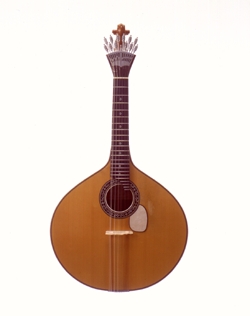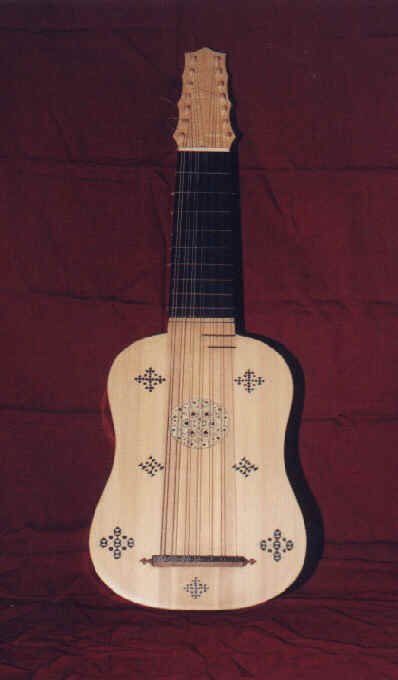The lute, al-`ud; vihuela, viola
The lute, al-`ud
The musical instrument
 we call
lute
in English,
(French: luth,
German: Laute,
Dutch: luit,
Spanish: laúd,
Portuguese: alaúde)
takes it name from the Arabic word
al-`u:d, or
العود
in Arabic script.
we call
lute
in English,
(French: luth,
German: Laute,
Dutch: luit,
Spanish: laúd,
Portuguese: alaúde)
takes it name from the Arabic word
al-`u:d, or
العود
in Arabic script.
The definite article al
has become part of the word in the other languages.
The sound I transcribe here by ` is a
pharyngal voiced approximant.
According to
A
Dictionary of Modern Written Arabic, by Hans Wehr, edited by J M. Cowan,
this word `u:d
(عود) has these meanings:
wood; stick, rod, pole; branch, twig, switch; stem, stalk; cane,
reed; aloes (wood); lute (musical instrument); body, build,
physique; strength, force, intensity;
The original
Arabic instrument,
most often called
oud,
which looks
 similar
to a lute, but not the same, also still exists.
It is one of the instruments that
Gregor Schaefer
plays.
similar
to a lute, but not the same, also still exists.
It is one of the instruments that
Gregor Schaefer
plays.
Vihuela, viola
In Portuguese fado
music, the word guitarra is reserved
for the
Portuguese guitar
 ,
whereas what in most other languages is a
,
whereas what in most other languages is a
 guitar
is referred to as viola.
This has nothing to do with a bigger and lower sounding type of violin,
which is what the word
guitar
is referred to as viola.
This has nothing to do with a bigger and lower sounding type of violin,
which is what the word
 viola
means in other languages.
viola
means in other languages.
Interestingly,
Spanish
has the cognate word
 vihuela,
which also denotes a guitar-like shaped instrument.
The Portuguese word viola, says the
Porto Editora
dictionary, derives from Provençal
viula. Provençal, Occitan or Langue d'Oc
was the language of the troubadours, the
minstrels,
but not the
bards.
vihuela,
which also denotes a guitar-like shaped instrument.
The Portuguese word viola, says the
Porto Editora
dictionary, derives from Provençal
viula. Provençal, Occitan or Langue d'Oc
was the language of the troubadours, the
minstrels,
but not the
bards.
Copyright © 2003 by R. Harmsen.